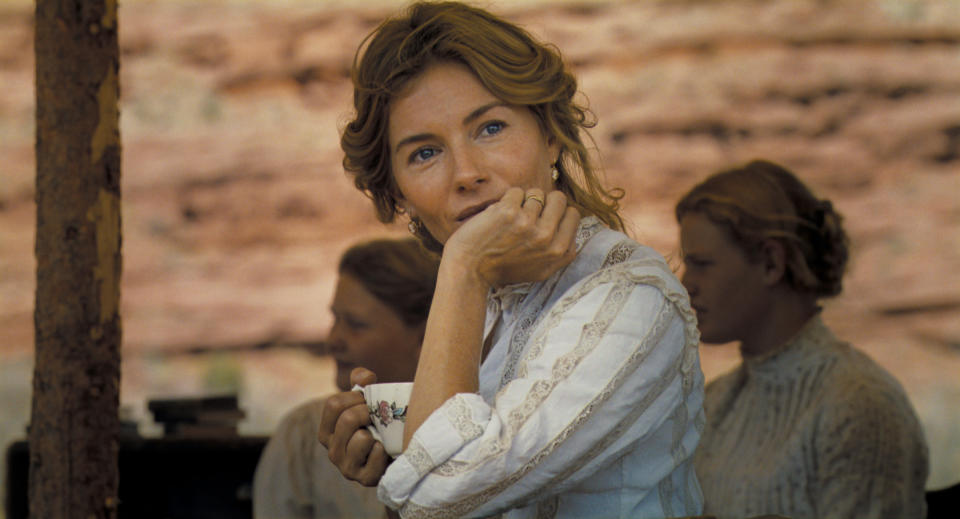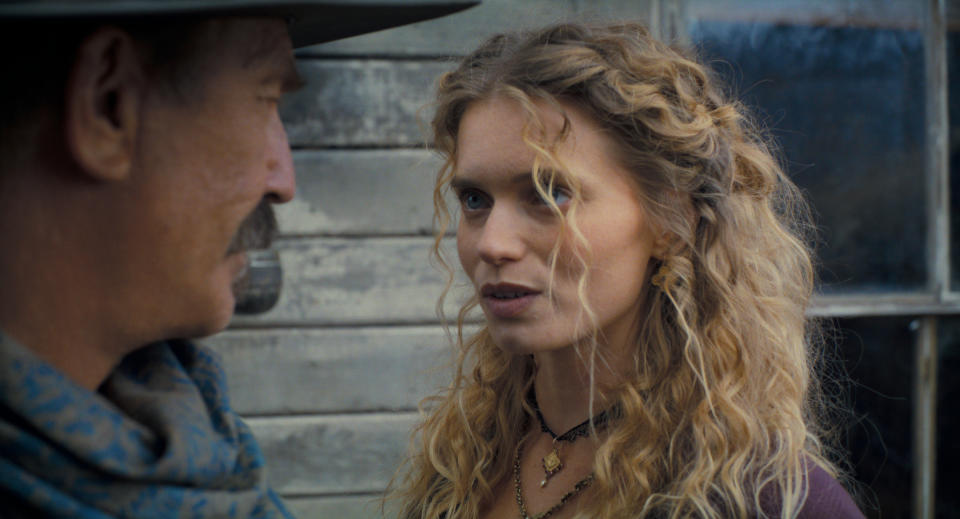Review: Kevin Costner's Horizon Falls Short of Great Western
Every time a filmmaker or showrunner takes a gamble on a big Western, a million journalists and critics start tippety-typing about how “The Western is back!” or “The Western never went away!” or “The Western is the genre we need now!” or even just—apropos of the enormous popularity of Yellowstone—“At last the ‘older’ audience gets the Western it craves and deserves!” It will be easy for those writers to apply most of those truisms, if not all of them, to Kevin Costner’s Horizon: An American Saga, an ambitious four-part epic about white people pushing into the west—and, with barely a moral qualm, taking for themselves land that had been inhabited by indigenous people for thousands of years. The first three-hour chunk of Horizon, conveniently called Chapter 1, premiered out of competition at the Cannes Film Festival on Sunday evening, with its creator, star, and chief risk taker, Kevin Costner, in attendance. The film—and let’s call it a film, although it appears to have been structured to be amenable to smaller, television-episode-sized bites—played well to an international crowd, and Costner was visibly moved by their enthusiastic and affectionate response.
Only a truly churlish person would want to deny Costner this moment of glory: he has nurtured this idea for more than 30 years, and he’s spent roughly $20 million of his own money just to get it going. (Chapter 1 will open in North American theaters on June 28, with Chapter 2 following in August. There are no release dates for the remaining two chapters.) Costner hasn’t always been the greatest actor, but he’s always been a handsome, appealing figure, the kind of performer who gives the appearance of handling stardom with an easy shrug. And in recent years, his performances have become more energized—his silver-fox gravitas has a bit of kick to it. (He was terrific in the 2020 western thriller Let Him Go, as a retired sheriff who sets out to rescue his young grandson from a creepy, backwards clan.) As Hayes Ellison in Chapter 1 of Horizon, he’s less a star than an anchoring presence. When he finally rides into the movie, about an hour in—and after a deadly protracted battle between Apaches and white settlers—you feel the movie can begin in earnest. Hayes is laconic, wary; he’s suffered in life, though we don’t yet know how. His costumes also have the best color scheme, consisting mostly of soft, tonal smokey blues, and he gets the best bandana: while the other guys wear rough cotton things tied any old which way, Hayes’s scarf is supple, delicately printed, artfully draped—somebody’s got to bring a little sprezzatura to the frontier.
But overall, Horizon comes trotting at us a little too gently. Westerns don’t need a special reason to exist, at least if you ask me: the genre is as sturdy and rich as the action movie, the romantic comedy, the crime thriller. There’s a lot that a creative, devoted filmmaker can do with just the classic framework. But Horizon—while being at least somewhat culturally sensitive, handsome to look at, and reasonably engaging—still comes off as curiously undistinguished. It’s so tasteful, so careful, so eager not to upset or offend, that it reflects little sense of risk. Horizon: Chapter 1 feels deeply conservative in the cultural sense; it has no reason to exist other than to remind us how great the great Westerns are, without (thus far, at least) actually being great itself.
That’s ironic considering how high the stakes are for Costner, and you can’t look at Horizon and deduce that he doesn’t care. If anything, he cares too much. He and cowriter Jon Baird have come up with a complicated plot, filled with characters who churn around one another, sometimes doing little more than taking up space. Some of the action is set in Arizona’s San Pedro Valley, where a group of settlers have staked their future on a new town called Horizon. Now and then, it shifts to Montana Territory, where a separate group of pioneers trundle across the landscape in their covered wagons, carefully husbanding their supply of fresh water, a precious resource.

In the town of Horizon, a few shaky structures have gone up; the inhabitants have gathered in one of them for a dance, which is where we first see young matriarch Frances Kittredge (Sienna Miller, giving the finest,most believable performance in the movie) urging her young teenage sone Nate (Hayes Costner, son of Kevin) to dance with her. He refuses, and she gently ribs him for being too embarrassed to take a spin with his mother. But the little family has barely reached their homestead when a group of angry Native Americans launch an attack. Frances and her teenage daughter Lizzie (Georgia MacPhail) survive, but they’re among a relatively lucky few. The United States Cavalry arrives eventually to help pick up the pieces; one of their numbers is a soulful young first lieutenant played by Sam Worthington. He passes his officer’s coat along to Frances, who, strong as she is, is also obviously riven with grief. If you catch a future romance sparking, you wouldn’t be wrong.
Elsewhere, in Montana Territory, a character played by Jena Malone (later we’ll learn her name is Ellen) shoots a guy and runs off with a baby, the sort of event that causes legions of note-taking critics to scribble things like “take baby why?” in their notebooks. Why, indeed? It turns out plenty of other people want that baby too, including Dale Dickey’s rough-mannered Mrs. Sykes and her scruffy offspring (played by Jamie Campbell Bower and Job Beavers). Other characters and plot points pile up quickly: Saucy entrepreneur Marigold (Abbey Lee) takes care of Ellen’s purloined baby by day (he’s now almost a toddler) and by night entertains visiting menfolk in the bedroom. When she sees Costner’s Hayes ride in, her eyes widen appreciatively. At a certain point, there will be tender, tasteful dry-humping.
Unsurprisingly, considering Costner was also the writer-director-star of Dances with Wolves, which tried to correct decades’ worth of damaging depictions of Indigenous Americans, Horizon is resolute in the way it deals with the “Nice land, think we’ll take it!” school of property acquisition. The Natives’ dilemma—they’d rather not fight the white people if they can help it, but how else can they keep their tribal land?—is represented largely by the actions of two Apache brothers, Pionsenay (Owen Crow Shoe) and Taklishim (Tatanka Means), who feel violence is their only recourse to defend their home and their people. Still, none of the Native characters are fleshed out as fully as they might be. Will their stories emerge in the coming installments? For now, we have to give Costner the benefit of the doubt. Meanwhile, in the name of sensitivity, Horizon twists itself into some historically inaccurate pretzel shapes: Worthingon’s First Lieutenant Trent Gephardt, a guy who sees exactly what’s happening and knows why it’s wrong, refers to the Natives repeatedly as “the Indigenous.” That’s a word very few of America’s white forbears would have used; lots of things might have turned out differently if they had.

But then, Horizon is striving for lots of things, including visual majesty, dramatic excitement, some sense of atonement for injustices that are essentially unforgivable. But mostly, it’s a Western in love with Westerns. John Debney’s score shoots for pure Elmer Bernstein-style grandeur—but it also feels like a facsimile, a copy of a copy that has lost some of its crispness. And though that attack on the Kittredges' homestead is beautifully blocked and shot, as well as harrowing, it still frames the Apaches as ruthless, faceless invaders. Costner, it seems, wants to have it both ways: to help us understand why Native populations would be forced to defend their land, even as he's essentially presenting them as "the other." His storytelling is missing a few beats here.
And there's another overarching problem. Horizon doesn’t come close to the unsparing emotional toughness of many of the 1950s Westerns by the likes of John Ford, Anthony Mann, and Budd Boetticher, or, for that matter, the later works of their Italian spiritual brethren, the double Sergios Leone and Corbucci. The greatest of those 1950s Westerns were brazen in addressing the feelings of helplessness that can plague the most ultra-masculine men. And those directors knew plenty about toxic masculinity long before the term was even coined. In Anthony Mann’s great 1958 Western Man of the West, a saloon singer played by Julie London is raped and beaten by outlaws—the events aren’t depicted, but Mann makes us feel the horror of them even so. The woman’s suffering isn’t just a dramatic device; it's a source of anguish for the movie’s hero, played by Gary Cooper, and for Mann himself.
Horizon is just getting started, but you can't imagine Costner even daring to tread into territory like that—complex human territory, as opposed to just genre territory. Maybe he'll push further in subsequent chapters. But for now, he’s just paying respectful homage. No matter how great he looks while doing it, it’s still not nearly enough.
Contact us at letters@time.com.

